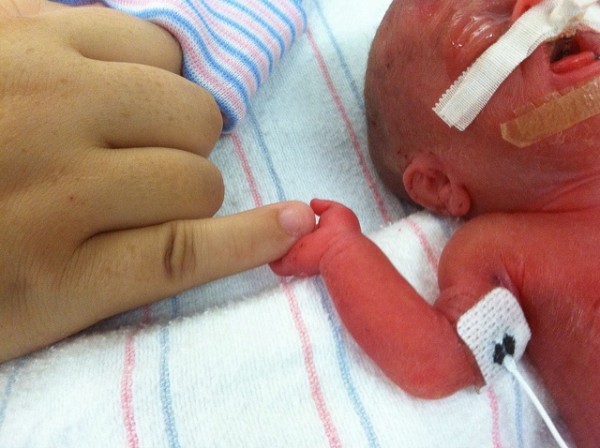Maternal Obesity Increases Risk of Oxygen Shortage in Newborns: Study

Children of overweight mums are at risk of suffering oxygen deficiency at birth, according to a study.
Maternal weight and obesity are linked to an infant's health like BMI levels, abdominal adiposity, blood sugar and cholesterol, which in turn give rise to heart diseases and diabetes in later years. Recently, Swedish scientists discovered that obese mothers are more likely to deliver babies that experience asphyxia, a condition of extreme shortage of oxygen in the body that is similar to suffocation caused by choking.
Their study looked at the Swedish birth registry to examine records of nearly 1.7 million births between 1992 and 2010 and used Apgar scores to measure oxygen deficit at birth. Apgar scores measure the baby's health after birth.
It was observed that children of mothers whose BMI levels ranged between 25 and 30 had 55 percent higher chances of having asphyxia within five minutes after birth. The study noted that higher the maternal BMI, lower the Apgar scores. The risk factors for obese women with BMI of 30 to 40 and those with 40 and above increased by two and three times, respectively. However, birth procedures like cesarean section were not related to oxygen shortfall at birth in babies of obese mothers.
"Our results add to previous knowledge that maternal overweight and obesity increase risks for maternal, fetal and neonatal complications, said Martina Persson, study author and researcher from the Swedish medical university Karolinska Institutet, reports the Live Science news.
The authors have not been able to determine the exact reasons for birth asphyxia and believe inflammation and metabolic changes in the mothers' body can shoot up insulin levels in fetus at birth.
"High levels of fetal insulin will accelerate fetal growth. Large Babies more often experience traumatic deliveries - a risk factor for birth asphyxia," Persson said urging women of reproductive ages to maintain a normal body weight before conception.
Birth asphyxia is caused by restricted blood supply from mothers' blood, long or difficult birth, lung blockage, anemia and early separation of placenta before birth. According to the Seattle Children's Foundation, birth asphyxia occurs in four of every 1,000 full term deliveries and is more common in preterm births.
Chronic oxygen deprivation and toxic formation in cells results in temporary or permanent damage to brain and vital organs Preterm babies born with asphyxia might have attention deficit hyperactivity disorder, development disorders, vision impairment and cerebral palsy.
More information is available online in the journal PloS Medicine.
May 21, 2014 05:13 AM EDT





